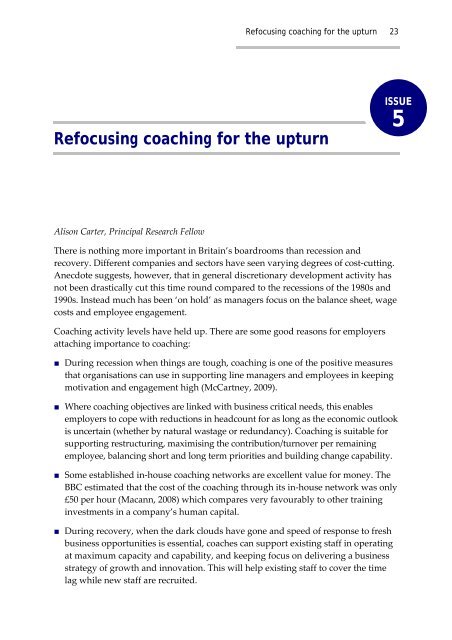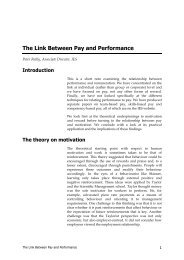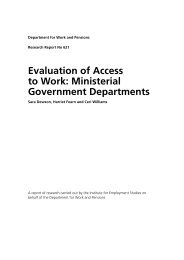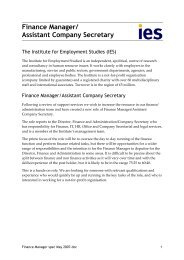PDF of this item - The Institute for Employment Studies
PDF of this item - The Institute for Employment Studies
PDF of this item - The Institute for Employment Studies
- No tags were found...
You also want an ePaper? Increase the reach of your titles
YUMPU automatically turns print PDFs into web optimized ePapers that Google loves.
Refocusing coaching <strong>for</strong> the upturn 23Refocusing coaching <strong>for</strong> the upturnISSUE5Alison Carter, Principal Research Fellow<strong>The</strong>re is nothing more important in Britain’s boardrooms than recession andrecovery. Different companies and sectors have seen varying degrees <strong>of</strong> cost‐cutting.Anecdote suggests, however, that in general discretionary development activity hasnot been drastically cut <strong>this</strong> time round compared to the recessions <strong>of</strong> the 1980s and1990s. Instead much has been ‘on hold’ as managers focus on the balance sheet, wagecosts and employee engagement.Coaching activity levels have held up. <strong>The</strong>re are some good reasons <strong>for</strong> employersattaching importance to coaching:■ During recession when things are tough, coaching is one <strong>of</strong> the positive measuresthat organisations can use in supporting line managers and employees in keepingmotivation and engagement high (McCartney, 2009).■ Where coaching objectives are linked with business critical needs, <strong>this</strong> enablesemployers to cope with reductions in headcount <strong>for</strong> as long as the economic outlookis uncertain (whether by natural wastage or redundancy). Coaching is suitable <strong>for</strong>supporting restructuring, maximising the contribution/turnover per remainingemployee, balancing short and long term priorities and building change capability.■ Some established in‐house coaching networks are excellent value <strong>for</strong> money. <strong>The</strong>BBC estimated that the cost <strong>of</strong> the coaching through its in‐house network was only£50 per hour (Macann, 2008) which compares very favourably to other traininginvestments in a company’s human capital.■ During recovery, when the dark clouds have gone and speed <strong>of</strong> response to freshbusiness opportunities is essential, coaches can support existing staff in operatingat maximum capacity and capability, and keeping focus on delivering a businessstrategy <strong>of</strong> growth and innovation. This will help existing staff to cover the timelag while new staff are recruited.
















